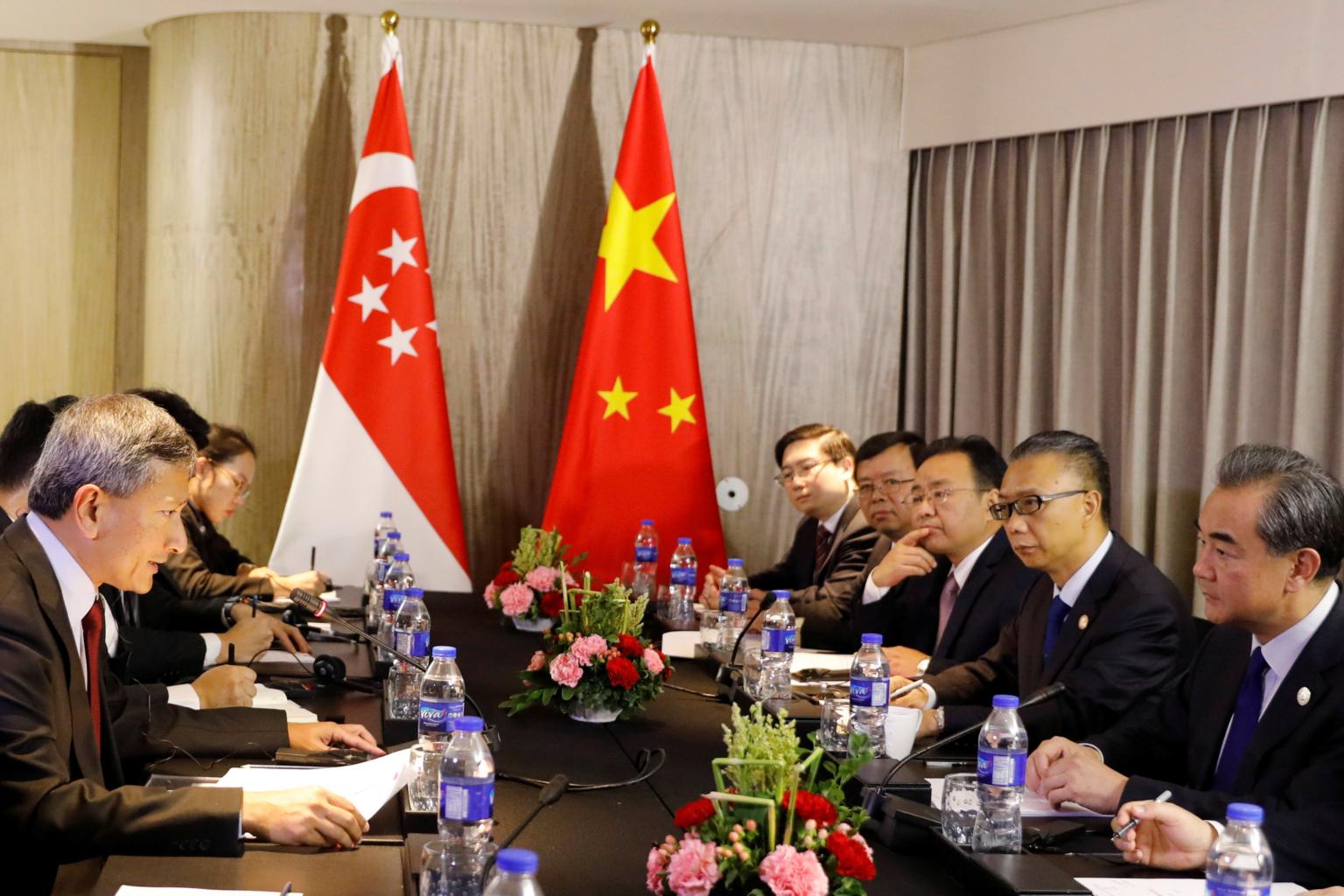China lauds Singapore's 'positive', 'constructive' role as Asean coordinator
Sign up now: Get ST's newsletters delivered to your inbox

China's Foreign Minister Wang Yi (right) and counterpart from Singapore Vivian Balakrishnan hold bilateral meeting on the sidelines of the 50th Association of Southeast Asia Nations (ASEAN) Regional Forum (ARF) in Manila, Philippines on Aug 6, 2017.
PHOTO: REUTERS
Follow topic:
MANILA - China on Sunday (Aug 6) lauded Singapore for its "positive" and "constructive" role this year as China-Asean coordinator.
"We commend Singapore for playing a positive and constructive role in advancing China-Asean relations," Chinese Foreign Minister Wang Yi told reporters.
He also wished Singapore well as it prepares to assume the chairmanship of the 10-member Association of Southeast Asian Nations (Asean) next year (2018), "doubling up as China-Asean coordinator".
"We believe in and wish Singapore well in taking up these two responsibilities. So, in the process of further improving China-Asean relations, Singapore can play its special and positive role," he said.
In remarks at the signing of an agreement on the "Asean China Centre", Singapore Foreign Minister Vivian Balakrishnan said Asean-China relations "are on a positive trajectory".
Singapore, as country coordinator of Asean-China dialogue relations for three years till mid 2018, has been instrumental in concluding talks on a framework of a code of conduct (COC) meant to prevent overlapping territorial claims in the South China Sea from erupting into violent confrontations.
The framework was adopted during a dialogue between Asean and China, paving the way for actual negotiations to take place.
Chinese Foreign Minister Wang Yi said negotiations would start this year, and whatever agreement is made must be adhered to.
"The finalised framework of the COC on the South China Sea brings stability to the issue, thus demonstrating a positive momentum. This shows our common wish to protect the peace and stability in the South China Sea," Chinese Foreign Minister Wang told reporters.
Mr Wang said the situation is "now more relaxed, conducive to stability".
The framework emphasises that the COC "is not an instrument to settle territorial disputes or maritime delimitation issues."
It instead promotes "mutual trust, cooperation and confidence, prevent incidents, manage incidents should they occur and create a favourable environment for the peaceful resolution of disputes".
Mr Wang said the framework will now be elevated to the leaders, who are expected to instruct both sides to take steps towards actual negotiations for a COC.
"First step, 11 ministers passed or approved the COC framework, announcing that we will start actual negotiations of the COC within the year," he said.
He added that at a working meeting to implement a 2002 declaration that calls on claimants to exercise restraint and stop new occupation in the South China Sea, "various parties will together explore the thinking, principles and plan behind the actual negotiations of the COC, so as to make necessary preparations to reach a consensus between Asean and China".
"Third step, with the South China Sea stable and no interference from external parties, we will then consider announcing the formal beginning of negotiations of the text of the COC when the leaders of China and Asean meet in November," he added.
The framework does not, however, cover discussions on whether the COC should be legally binding. That will have to be thrashed out during future discussions on the code itself.
Asean Secretary-General Le Luong Minh told The Straits Times he believes the framework should be legally binding.
"A framework is a framework. But the framework will hopefully pave the way towards meaningful and substantive negotiations towards the conclusion of a COC. It must be able not only to prevent but also to manage incidents of the kind that have taken place so far. For that COC to be effective, it will have to be legally binding," he said.
Finalising the code has acquired urgency due to series of confrontations between China and other claimant states. China claims nearly all of the resource-rich South China Sea that is also claimed by ASEAN members Vietnam, Malaysia, Brunei and the Philippines.
Efforts to finalise the COC pact have dragged on for years without any sign that such accord will ever be achieved.
rdancel@sph.com.sg

